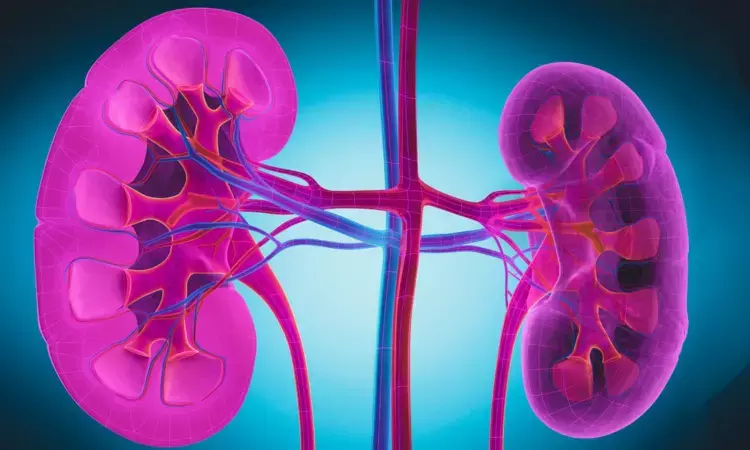- Home
- Medical news & Guidelines
- Anesthesiology
- Cardiology and CTVS
- Critical Care
- Dentistry
- Dermatology
- Diabetes and Endocrinology
- ENT
- Gastroenterology
- Medicine
- Nephrology
- Neurology
- Obstretics-Gynaecology
- Oncology
- Ophthalmology
- Orthopaedics
- Pediatrics-Neonatology
- Psychiatry
- Pulmonology
- Radiology
- Surgery
- Urology
- Laboratory Medicine
- Diet
- Nursing
- Paramedical
- Physiotherapy
- Health news
- Fact Check
- Bone Health Fact Check
- Brain Health Fact Check
- Cancer Related Fact Check
- Child Care Fact Check
- Dental and oral health fact check
- Diabetes and metabolic health fact check
- Diet and Nutrition Fact Check
- Eye and ENT Care Fact Check
- Fitness fact check
- Gut health fact check
- Heart health fact check
- Kidney health fact check
- Medical education fact check
- Men's health fact check
- Respiratory fact check
- Skin and hair care fact check
- Vaccine and Immunization fact check
- Women's health fact check
- AYUSH
- State News
- Andaman and Nicobar Islands
- Andhra Pradesh
- Arunachal Pradesh
- Assam
- Bihar
- Chandigarh
- Chattisgarh
- Dadra and Nagar Haveli
- Daman and Diu
- Delhi
- Goa
- Gujarat
- Haryana
- Himachal Pradesh
- Jammu & Kashmir
- Jharkhand
- Karnataka
- Kerala
- Ladakh
- Lakshadweep
- Madhya Pradesh
- Maharashtra
- Manipur
- Meghalaya
- Mizoram
- Nagaland
- Odisha
- Puducherry
- Punjab
- Rajasthan
- Sikkim
- Tamil Nadu
- Telangana
- Tripura
- Uttar Pradesh
- Uttrakhand
- West Bengal
- Medical Education
- Industry
High Dose Glucocorticoids Improve Renal Outcomes but Increase Infection and Mortality in Lupus Nephritis: Study

Researchers have found that higher doses of glucocorticoids during initial therapy for lupus nephritis (LN) lead to improved renal outcomes but are associated with an increased risk of infections and mortality. This conclusion emerges from a systematic review and meta-analysis of control arms from randomized clinical trials (RCTs), shedding light on the delicate balance between efficacy and safety in treating LN. The study was recently published in Arthritis & Rheumatology by Gabriel F. and colleagues.
Lupus nephritis is a severe manifestation of systemic lupus erythematosus (SLE) characterized by inflammation of the kidneys. Effective management of LN is crucial to prevent kidney failure and improve patient outcomes. Glucocorticoids, combined with mycophenolic acid analogs or cyclophosphamide, are standard treatments for LN. However, the optimal dosing regimen to maximize renal response while minimizing adverse effects remains unclear.
The study involved a systematic review and meta-analysis of the control arms of RCTs involving biopsy-proven LN patients. These trials used standardized glucocorticoid regimens alongside either mycophenolic acid analogs or cyclophosphamide and reported outcomes such as complete response (CR), serious infections, and death. Data on glucocorticoid dosing, tapering schemes, and use of glucocorticoid pulses were collected. Meta-analyses of proportions, meta-regression, and subgroup analyses were conducted at six and twelve months for all outcomes.
The analysis included 50 RCT arms, encompassing 3,231 LN patients. Predicted rates for patients starting with oral prednisone 25 mg/day without pulses were:
Complete Response (CR): 19.5% (95% CI, 7.3–31.5)
Serious Infections: 3.2% (95% CI, 2.4–4.0)
Mortality: 0.2% (95% CI, 0.0–0.4)
In contrast, starting with prednisone 60 mg/day (without pulses) showed:
CR: 34.6% (95% CI, 16.9–52.3)
Serious Infections: 12.1% (95% CI, 9.3–14.9)
Mortality: 2.7% (95% CI, 0.0–5.3)
The addition of glucocorticoid pulses further increased the rates of CR and mortality but did not significantly affect the rate of serious infections. A dose-response relationship was observed between the initial glucocorticoid dose and all outcomes at six months, accounting for glucocorticoid pulses, underlying immunosuppressants, and baseline proteinuria.
The study demonstrates that higher initial doses of glucocorticoids can enhance renal response in LN patients, but this benefit comes at the cost of higher rates of serious infections and mortality. This finding is crucial for clinicians who must weigh the benefits of improved renal outcomes against the risks of adverse effects when prescribing glucocorticoids for LN.
Higher exposure to glucocorticoids during the initial treatment phase of lupus nephritis is associated with better renal outcomes but also leads to increased risks of infections and mortality. These findings underscore the importance of individualized treatment plans and the need for close monitoring to balance efficacy and safety in managing LN.
Reference:
Figueroa-Parra, G., Cuéllar-Gutiérrez, M. C., González-Treviño, M., Sanchez-Rodriguez, A., Flores-Gouyonnet, J., Meade-Aguilar, J. A., Prokop, L. J., Murad, M. H., Dall’Era, M., Rovin, B. H., Houssiau, F., Tamirou, F., Fervenza, F. C., Crowson, C. S., Putman, M. S., & Duarte-García, A. (2024). Impact of glucocorticoid dose on complete response, serious infections, and mortality during the initial therapy of lupus nephritis: A systematic review and meta‐analysis of the control arms of randomized controlled trials. Arthritis & Rheumatology. https://doi.org/10.1002/art.42920
Dr Riya Dave has completed dentistry from Gujarat University in 2022. She is a dentist and accomplished medical and scientific writer known for her commitment to bridging the gap between clinical expertise and accessible healthcare information. She has been actively involved in writing blogs related to health and wellness.
Dr Kamal Kant Kohli-MBBS, DTCD- a chest specialist with more than 30 years of practice and a flair for writing clinical articles, Dr Kamal Kant Kohli joined Medical Dialogues as a Chief Editor of Medical News. Besides writing articles, as an editor, he proofreads and verifies all the medical content published on Medical Dialogues including those coming from journals, studies,medical conferences,guidelines etc. Email: drkohli@medicaldialogues.in. Contact no. 011-43720751


